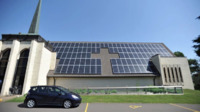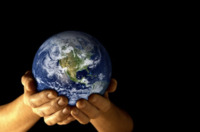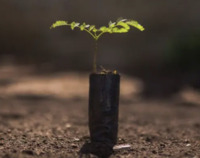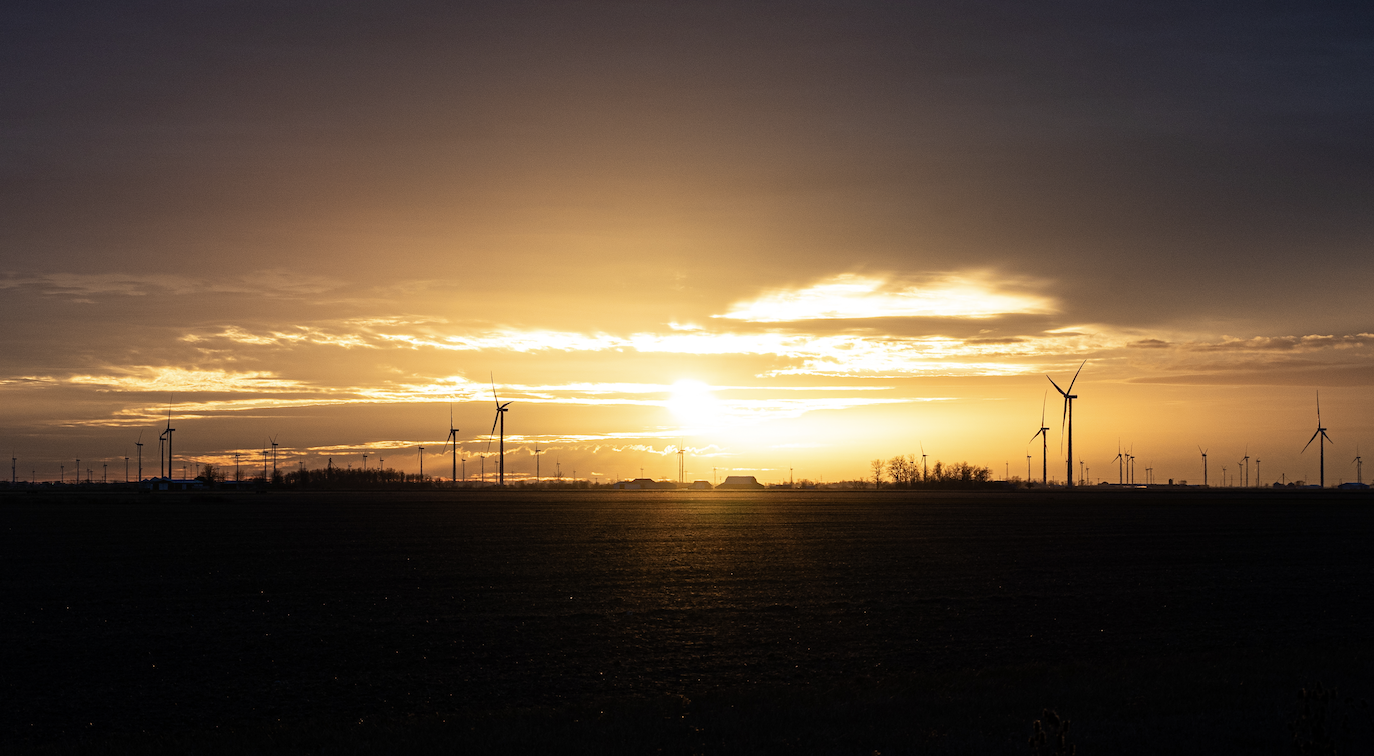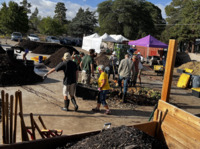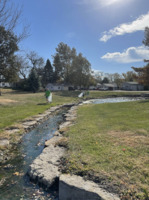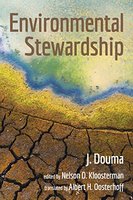Search
143 items
-
Marianist Environmental Education Center
"The Marianist Environmental Education Center (MEEC) is an environmental education community in the Catholic tradition. In Mary's hope-filled spirit, we preserve and act in communion with the land and educate other communities in sustainability through ecology-based simple living, social justice and spirituality." -
Congregational Solar Resources
"This is a great time to put solar on your church, synagogue, mosque, or other faith community property with the new federal funding available for nonprofits through the Inflation Reduction Act. It’s like a sale on solar, a 30% discount! The 1300 IPL congregations listed in the directory below have the combined capacity of 105 Megawatts of solar – approaching the amount of FaceBook, the 10th largest commercial user. Save on your energy bill and have more for your mission. Read below to find out how to fund solar on your church building, find a solar installer, and get an award." -
Evolution of the Collective Unconscious
"The collective unconscious is made up of experiential knowledge, symbols, and imagery that humans are naturally born with (no tabula rasa) and are rooted in ancestral experience and shared by all persons in all cultures. After millennia of evolution, the current collective unconscious of humanity would seem to include human exceptionalism, patriarchal hegemony, short-terminism, delusions of grandeur, illusions of unending growth, and the idolatry of technology. As the planet becomes overloaded with industrial civilization, our collective mindset seems to be unwilling to think long-term and face the realities of ecological overshoot. It remains to be seen whether our collective mindset can evolve to voluntarily refocus human agency toward contraction of the human enterprise, simplification of lifestyles, and peaceful resolution of conflicts before it is too late to prevent a chaotic collapse of industrial civilization." -
Why Conservative Christians Don’t Believe in Climate Change
"American Christians have become increasingly polarized on issues of climate change and environmental regulation. In recent years, mainline Protestant denominations and the Roman Catholic Church have made explicit declarations of support for global climate action. Prominent Southern Baptists and other evangelical Protestants, on the other hand, have issued statements that are strikingly similar to the talking points of secular climate skeptics, and have attempted to stamp out 'green' efforts within their own ranks. An analysis of resolutions and campaigns by evangelicals over the past 40 years shows that anti-environmentalism within conservative Christianity stems from fears that 'stewardship' of God's creation is drifting toward
neo-pagan nature worship, and from apocalyptic beliefs about 'end times' that make it pointless to worry about global warming. As the climate crisis deepens, the moral authority of Christian leaders and organizations may play a decisive role in swaying public policy toward (or away from) action to mitigate global warming." -
Taoist monks find new role as environmentalists
This article details the efforts of Taoist leaders in China to incorporate sustainability in Taoist temples and promote a culture of environmentalism. Since 2006, the Daoist Ecological Protection Network has gained the support of 120 temples who have converted to the use of solar panels and biofuels. Taoist monks noticed many people to be ignorant towards their environmental impact, living a life of hyper-materialism. Monks wanted to help educate society about the actions that can be taken to ameliorate environmental issues both at the temples and in daily life. This pursuit is driven by a fundamental belief in Taoism to live in harmony with nature, a value that could have large impacts on society if adopted. -
Turning Around Our Relationship with Earth is a Teshuvah Project
The author recounts an unsettling encounter with a utility worker who downplayed the environmental harm of her gas leak. From here, she explains the true negative impacts of methane emissions on both people and the climate, and encourages us to act in a way that "turns around our relationship with Earth". She connects this with the Jewish tradition of Teshuvah, the time in between Rosh Hashanah and Yom Kuppur meant for repentance. -
Al-Mizan: Covenant for the Earth
"The Covenant presents an Islamic outlook on the environment in a bid to strengthen local, regional, and international actions to combat the triple planetary crises defined by the United Nations as climate change, biodiversity loss and pollution. It is a global endeavour to engage Muslims from all levels of society in the development and adoption of this call...
Al-Mizan - A Covenant for the Earth is a restatement of the principles governing the protection of nature in a form that meets current challenges. It examines the ethics behind the social patterning of human existence and enquires into how they could be brought to life today working in harmony with the heartbeat of the natural world." -
Rising: Dispatches from the New American Shore
This resource contains a series of vignettes following Elizabeth Rush as she meets people all around American who have been affected in some way by global sea rising, as well as some of her own personal experiences. She gives voice to those otherwise not heard, and shares eye opening testimonials from those who experience the effects firsthand. -
Plant With Purpose
Plant With Purpose works to restore forests by planting trees in the most devastated and vulnerable parts of the world. They do this because they view the issues of global poverty and environmental damage as interconnected. -
A Walk with Sustainability…and the Bolivian Llamas
"In this picture, I am working alongside two rural Bolivian community members (and a llama), collaborating on the design of a water system. The community had no running water, phone service only on hills, cut plastic liter bottles in half for gutters, and still gave me soups and meals as a welcoming and thankfulness. Their kindness, harmony with the land around them, and joy radiated, deeply resonating with my idea of how to live a sustainable, happy life. Sustainability is not buying a reusable water bottle…every 3 months because a new, better, more cool version is here. It is living in gratitude and simplicity with the people and nature around you." Taken by Megan Oleksik. Submitted to the RESTORExchange Sustainability Contest. -
Living Minimally
"The image shows my crew's pitched tents on a beautiful summer day in Indian, Alaska. We were firefighters living mostly out of our tents for the summer. Conservation work and living minimally were ways I practiced sustainability in my life and connected to nature." Taken by Kelsey Wolf. Submitted to the Sustainability Photo Contest. -
As Dusk Dawns
"This photo was taken in Paulding County Ohio. In the back ground is Haviland Tile and their new small ethonal plant. All bringing sustainability together." Taken by Jamie Merriman. Submitted to Sustainability Photo Contest. -
Windmills of Northwest Ohio
"Windmills of Northwest Ohio" Taken by Townsend Wilkinson. Submitted to the Sustainability Photo Contest. -
Keeping Our Campus Clean
"This picture was taken on my college campus in Missouri. If you’re looking at the photo and you think you see trash bags, then you would be correct. We were doing a nature walk around campus and collecting any trash or recycling that has made its way onto campus. Our grounds team does an amazing job at keeping our campus clean but because of how close neighboring houses are, sometimes trash blows into our little creek. This creek is home to a turtle who likes to pop his head out every once in a while and startle you. There are also quite a lot of different bugs in this area that like to stay near the water!" Taken by Erin Frink. Submitted to the RESTORExchange Sustainability Photo Contest. -
Federal Funding for Energy Work at Houses of Worship
This website contains a collection of resources and links for federal funding information. This includes informative resources, webinars, and information on grants and tax credits. Nonprofits and houses of worship can use these resources to find funding their environmentalist projects and actions. -
A Jewish Response to Environmental Stewardship: LEEDing the Way
The article highlights Temple Israel of Minneapolis's achievement of LEED Gold Certification, reflecting their commitment to sustainability through a multi-year renovation project. This accomplishment aligns with their Jewish values, particularly the principle of Pikuach Nefesh, which emphasizes protecting life and the environment. The synagogue's efforts extend beyond their building to include community-wide initiatives such as climate action resource fairs and partnerships with environmental organizations. Their ongoing commitment to sustainability is showcased through continuous improvements and active participation in broader climate justice movements. -
Lutherans Reflect on Climate Change Conference in Copenhagen
This article discusses some of the sentiments regarding proceedings from the 2009 United Nations Climate Change Conference in Copenhagen. While some attendees expressed disappointment in the outcome, others were more optimistic about steps which may lead to more effective action for climate change in the future. The following excerpt provides a brief description of the event:
"More than 3,000 ELCA members, along with a coalition of U.S. faith leaders, sent some 20,000 postcards to President Barack Obama, urging him to be at the meeting, she said. Obama attended the conference and urged leaders of Brazil, China, India and South Africa to join the United States 'to fund developing nations' projects to deal with droughts,
floods and other impacts of climate change, and to develop clean energy,' among other agreements, according to a U.N. news release." -
Caring for Creation Today
This video, put forth by the Evangelical Church in America, encourages individuals to act as stewards by both assisting those in need and caring for our land, as God had intended. The salient message is to do what you can to work for change and care for God's creation, as this is our duty as humans. -
ISNA Green Initiative
The “ISNA Green Initiative” was formed in December of 2014 as one initiative for the Islamic Society of North America (ISNA). The group aims to raise awareness of issues concerning the protection and conservation of the environment, as well as promote a sense of urgency with regard to the catastrophic effects of climate change.
The ISNA Green Initiative Team has created a myriad of ways to promote environmental social justice within the Muslim community. The group has developed standards for transforming Masajid into environmentally friendly places of worship and promoting standards for building Masjid that meet the standards of green architecture. One example of their educational programming includes the promotion of the practice of a “Green Ramadan,” designed to reduce waste, conserve resources, and reduce the use of harmful products such as plastic water bottles and styrofoam. Another example includes promoting the use of solar energy to reduce the use of fossil fuels. -
Engaged Organizations: Global Oneness Project
The Global Oneness Project was founded in 2006 as an initiative of Kalliopeia Foundation, and is focused on education aimed a planting seeds of empathy, resilience, and a sacred relationship to our planet. They are passionate about the power of stories and offer a rich library of multimedia stories comprised of award-winning films, photo essays, and essays as well as companion curriculum and discussion guides focused on world culture, social justice and sustainability. -
Environmental Stewardship
This book goes into detail about how the Christian religion goes about environmental stewardship. They look at how bible passages talk about preserving the Earth and the morals we should have surrounding it. It dives deep into how science interacts with human interaction with the Earth and the damage that we have done to Earth, as well as what we should do to correct ourselves. -
How Buddhist monks in Ladakh are fighting climate change
Buddhists Monks in the Himalayas are taking a stand to climate change. On Earth Day 2018, thousands of people came together in the village of Yerat to plant trees. The region is rapidly losing glaciers, causing a shortage in water supply to the villages in the area who rely on snowmelt for water. The volunteers were inspired to participate due to their devotion to His Holiness Kyabgön Chetsang Rinpoche and his vision for "a more verdant and organic Ladakh." -
Seeing true nature: Buddhism and the environment
John Worthington-Hill describes how Buddhism can encourage environmental awareness and sustainability. Embracing individuality is our disconnection from the natural world. In order to live in unity with the earth, we must find the 'middle way' (a buddhist morality based on self-discipline). "Self-centeredness is the great illness from which all imbalance, insensitivity and abuse ultimately stem – an illness directly linked to the Buddha’s ‘three poisons of greed, ill-will and delusion’. These poisonous mentalities seep into the collective consciousness and are instilled in the norms and structures of culture and society, helping to direct how politics and economics deal with the environment." "Environmental destruction is therefore an outer manifestation of an inner affliction. If our thoughts are polluted, then our actions will be polluted too, and so will their consequences." -
Five Years After Speaking Out on Climate Change, Pope Francis Sounds an Urgent Alarm
This article covers Pope Francis's reaction to the world governments responses to climate change. The Pope writes to unite people through religion in an effort to bring awareness to the movement. The article details how the church is divesting in fossil fuel companies. The article also focuses on the political divide and how it affects people's views on the climate crisis.


